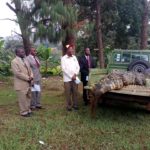President Yoweri Museveni has said that for Africa to conserve her wildlife, the environment and all her natural habitat, the continent needs to invest in the transformation of her population.
Museveni said that this will enable people to shift from low technological agriculture to industrialization and services sector.
“There are four threats to elephants and to all conservation efforts; markets for ivory and animal horns, criminality and corruption internationally and in individual countries, an under developed population and democracy” President Museveni said.
Adding “With an under-developed population, even if you stop the markets and the criminals, it will still be a threat to animals. Maintaining under development is a threat. I hope it’s not part of the conservation. You cannot maintain an under developed population and think that you can maintain conservation. It is not possible,” he said.
Museveni made the remarks while addressing the inaugural Giants Club summit; an organization of Heads of State, business leaders, key influencers and conservation experts devoted to ensuring a future for elephants and the landscapes they depend on forever.
The African continent has lost more than 70 per cent of elephant stock to poaching. The Giant’s Club has the Uganda, Kenyan, Gabon and Botswana’s presidents as members and has several philanthropists, environmentalists, conservationists, and several stakeholders in the tourism and wildlife conservation sector.
Museveni said in democracy, when people invade wetlands, forests etc it is not easy to get them out.
“When my voters invade the wetlands or forests, it is not easy to get them out otherwise they will vote me out. In my opinion, I would propose that you address the strategic challenges of shifting the population from low technology agriculture to industry and services.
It becomes easy to mobilize resources internationally to metamorphosis the population from pre-industry to industrialization. In Europe only 2 per cent of the people are in agriculture, the rest are in industry and services,” he said.
He emphasized that if the population remains in low agriculture and it is growing, the only solution is to invade forests for arable land and it’s not only the elephants but conservation suffers.
“Modernization of infrastructure including roads, electricity, railway etc will attract industries and services and in turn attract people away from agriculture into industrialization. There are too many people in disguised unemployment (agriculture) in the villages,” he said.
“In my opinion, a multi-dimensional approach to these issues will solve the problems. Deal with the demographics and changing population attitudes. In Uganda, by 1986 the population of elephants dwindled to 2000 from 30,000. It has now grown to about 6000 because of our strong stand on conservation. For us, we send poachers to heaven prematurely,” he said.
Museveni said the biggest challenge that Uganda is struggling with now are people encroaching on forests, wetlands etc.On his part, the host and Kenyan President Uluru Kenyatta, said conservation of the African elephant is no easy matter.
“These giants must contend with many threats: illegal killing for ivory and other products; conflict with humans; and loss and fragmentation of habitat. For some elephant populations, the magnitude of these threats is such that many predict they may be lost entirely. But if we act as would be required of us, I am convinced they will not be lost” Kenyatta said.
Adding “There is convincing evidence poaching is aided by international criminal syndicates; it fuels corruption; it undermines the rule of law and security; it even provides funding for other trans-national crime. This directly threatens the capacity of our nations to achieve sustainable and meaningful socio-economic development”
President Ali Bongo of Gabon said that poaching is not only dangerous to the tourism and wildlife conservation efforts but to the lives of its people and the future generation.
“Illegal gangs look for tasks to finance other activities like drugs and human trafficking. This illicit trade has contributed to insecurity and instability on the African continent,” he said.
President Bongo said citizens need to be sensitized on the importance of wildlife and conservation.“It’s a challenge in my country. My voters say elephants can’t be more important than people. In the next elections, they are telling me to go ask elephants to vote for me,” he said.







